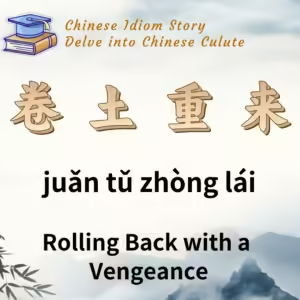
Chinese Idiom: 骄兵必败 (Jiao Bing Bi Bai)
English Translation: Arrogant Troops Are Sure to Be Defeated
pīn yīn: jiāo bīng bì bài
Idiom Meaning: This idiom metaphorically suggests that an arrogant and overconfident army is destined to suffer defeat. It also broadly applies to work and study, indicating that those who are proud and self-important are likely to fail. “骄兵” (jiāo bīng) refers to an army that is overconfident and underestimates the enemy.
Historical Source: Book of Han (汉书) – Biography of Wei Xiang
Idiom Story:
The concept of “arrogant troops” has various interpretations throughout history. In the Ming Dynasty, the scholar Zhang Ying, in his work The Uncommon Tales of Zhuge Kongming, articulated that there are different types of armies: those that fight for justice, those that defend themselves, those that engage out of petty grievances, and those that invade for personal gain. Among these, an army that relies on its size and population, considering itself invincible, is termed “arrogant troops” and is doomed to defeat.
The notion of “arrogant troops must be defeated” dates back to the early Western Han Dynasty. According to the Book of Han, there was a small nation called Cheshir located in the northeastern part of present-day Xinjiang, which suffered under the pressure of the Han Dynasty and the Xiongnu. In 68 BC, Cheshir surrendered to the Han. However, the Xiongnu, unwilling to relinquish this fertile land, launched an attack on Cheshir.
At that time, Zheng Ji, an official stationed in the region, led troops to rescue Cheshir but was defeated due to insufficient manpower. Zheng Ji then submitted a petition to Emperor Xuan, requesting reinforcements. Upon receiving this urgent plea, Emperor Xuan consulted with General Zhao Chongguo and other officials to prepare a large-scale attack against the Xiongnu to eliminate long-standing border threats. However, Prime Minister Wei Xiang disagreed with this approach and submitted a detailed analysis of the situation.
In his advice, Wei Xiang stated, “Those who rely on their large population and wish to showcase their might to the enemy are called arrogant troops. Arrogant troops are bound to be destroyed.” He emphasized that overconfidence leads to downfall. His counsel was accepted by Emperor Xuan, resulting in the cancellation of the plan to send more troops to Cheshir.
This idiom underscores the idea that arrogance and overconfidence, whether in military or other contexts, can lead to failure and disaster.






